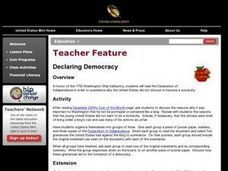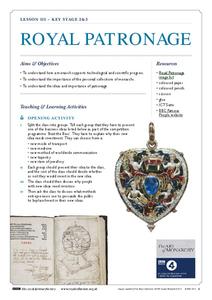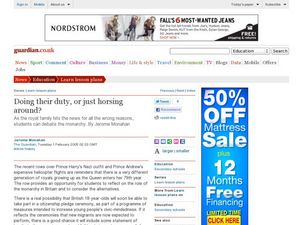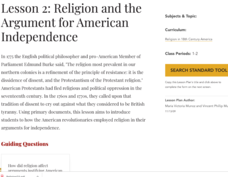BBC
The Role of a Monarch (key stage 2 and 3)
What makes a good monarch? Elementary and middle schoolers examine popular symbols of the British monarchy before designing a television advertisement about the qualities needed in a monarch. Next, they write poems using metaphors and...
Curated OER
Grievances Against the British Monarchy
Students review George Washington's reasons for not wanting to be viewed as a monarch. They review the Declaration of Independence and identify five grievances the United States had against the British monarchy. In groups, students...
BBC
The Monarch's Changing Role
Though the grandeur and elegance of the British palace remains unchanged throughout history, the role of the monarch has shifted from absolute rule to collaboration with a constitutional parliament. Young historians learn about the...
National Endowment for the Humanities
Background on the Patriot Attitude toward the Monarch
Learners explain the Patriot attitude toward the British monarchy, which helps them embrace the Founders' reluctance to have a strong executive under the Articles of Confederation as well as their desire to build in checks of executive...
BBC
Royal Patronage
The relationship between European royalty and the artists, scientists, and philosophers they support has been a building block in the artistic and technological progress throughout the world. Learn more about patronage throughout the...
Curated OER
Doing Their Duty, or Just Horsing Around?
Students consider the role of the British monarchy. In this Royal Family lesson, students access selected Web sites that require them consider what they know about royalty and whether or not they agree with the perks royalty enjoy.
National Endowment for the Humanities
Chief Executives Compared: The Federalist Papers
Delve into the responsibilities of the president by looking at President Hamilton's opinion of the presidential office in his own words. The second in a three-part series, the resource also offers an interesting compare-and-contrast...
National Endowment for the Humanities
The War in the South, 1778–1781
The second in a three-part look at the Revolutionary War focuses the years from 1778 through 1781 and zooms in on military operations in the southern colonies, the French alliance, and the role African-Americans played in events. Class...
Curated OER
Teachers: Citizenship: Government Central
Students research about the Queen and examine the arguments for and against having a Royal Family. They study the function of a monarchy and hold a debate.
Curated OER
It is Leff-tenant, Not Loo-tenant
Eleventh graders describe the role of the Lieutenant Governor. They create an employment advertisement for this position. Students research prominent British Columbians who may become nominees for the position of the next Lieutenant...
Curated OER
Royal Role Models
Students explore the Royal Family. Through reading news stories and research, studenets discover the function of the British monarchy. They discuss how the Royal Family should be expected to behave as role models.
Curated OER
Macbeth Madness
Learners participate in various social studies activities in correlation to William Shakespeare's Macbeth. In this Macbeth lesson, students study maps of Scotland, England, and Norway to identify locations mentioned in Macbeth. Learners...
Curated OER
What Experiences Shaped the Founders' Thinking about Government?
Young scholars study the ideas and experiences that shaped the founding fathers' perspective about government. In this the government lesson plan, students examine the Articles of Confederation as they relate to the power of government....
Curated OER
The Royal Family
Students pretend to be King or Queen. In this royal family lesson, students draw a family tree and review family vocabulary words. Students identify members of the royal family and take a royal family quiz. Students discuss their...
Curated OER
The War in the South, 1778-1781
Students explore the major terms of the Franco-American alliance and their importance to the cause of independence. The most important military engagements in the South are discussed and their significance for the outcome of the war noted.
National Endowment for the Humanities
Lesson 2: Religion and the Argument for American Independence
Young scholars examine how religion affected arguments justifying American independence. They read and analyze primary source documents, and write an essay analyzing how Americans used religious arguments to justify revolution against a...
National Endowment for the Humanities
Common Sense: The Rhetoric of Popular Democracy
Students identify important arguments for independence made in Thomas Paine's Common Sense. They explain why these arguments helped persuade American colonists that independence was necessary. Students describe the importance of Common...
Curated OER
The Marshall Plan for Rebuilding Western Europe
Pupils examine the aftermath of World War II. For this Marshall Plan lesson, students listen to their instructor present a lecture regarding the plan to rebuild Western Europe and its outcome. Pupils respond to discussion questions...
Curated OER
Moving Toward Independence
Eighth graders identify the reasons why colonists were fed up enough to want to break free of colonial rule and create their own government. They complete an in-dept analysis of the pamphlet Common Sense and it's role in fueling the...
Curated OER
Australia
First graders are introduced to the country of Australia through books, Internet research, maps and music. They listen to stories, watch videos, decorate cookies and participate in an Australian-themed day of activities.
Curated OER
The Jubilee Celebrations
Students read comments about the Queen's Jubilee made by children and get into groups to rank the comments in order of how much they agree with them. They then cut out each comment so that they can move them around more easily and stick...






















